
Bandy is a winter sport and ball sport played by two teams wearing ice skates on a large ice surface while using sticks to direct a ball into the opposing team's goal.
Sportin Latvia includes basketball, football, ice hockey, athletics (track), rugby, tennis, cycling, and others. Ice hockey is the most popular of the Latvian sports and is closely followed by basketball. Some of Latvia's most notable athletes include hockey player Sandis Ozoliņš, football player Māris Verpakovskis, Olympic javelin thrower Jānis Lūsis, two-time Olympic BMX champion Maris Strombergs, and basketball player Kristaps Porziņģis. The national sport of Latvia is ice hockey.
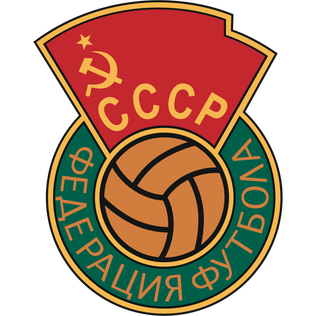
The Soviet Union national football team was the national football team of the Soviet Union from 1922-1992.
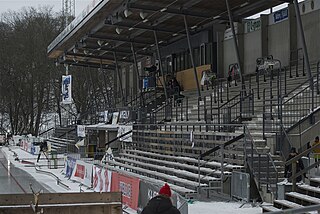
The Bandy World Championship is a competition for the men's teams of bandy-playing nations. The tournament is administrated by the Federation of International Bandy. It is distinct from the Bandy World Cup, a club competition, and from the Women's Bandy World Championship. A Youth Bandy World Championship also exists separately from the senior competition and has competitions in both the male and female categories.

The Soviet Union national bandy team represented the Soviet Union in bandy. It was controlled by the Federation of bandy and field hockey USSR. Even if bandy was a popular sport domestically in the 1920s and 1930s, the Soviet Union did not compete in any internationals back then. Agreements were made to play friendlies against Sweden in the late 1940s, but the plans did not come to realization. However, after having seen Finland, Norway and Sweden playing bandy at the Winter Olympics in Oslo in 1952, the Soviet Union invited these three countries to a four nation bandy tournament in 1954. This was the first time a Soviet national bandy team met other national bandy teams. The four countries used somewhat different rules prior to this tournament, but the rules were adjusted to be the same for the future.
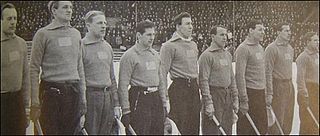
The Sweden national bandy team represents Sweden in the sport of bandy. There are two separate national teams, a national bandy team for men, and a national bandy team for women. This article deals chiefly with Sweden's national men's bandy team.
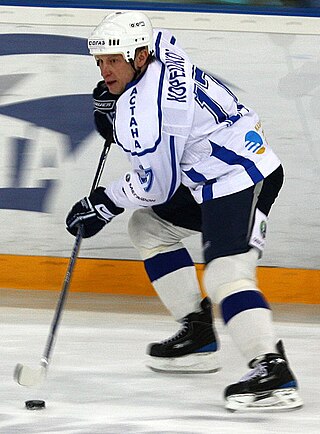
Kazakhstan's former long-term President, Nursultan Nazarbayev, has challenged sports organizers to engage 30 percent of the country's population in sports. The state has numerous sports clubs where people participate in various types of sports; sport facilities are available to the general public. Kazakhstan currently hosts major international tournaments; Astana and Almaty hosted the VII Asian Winter Games 2011, which drew teams from 27 countries.

The Russia national bandy team represents Russia in international bandy. There is a national team for men's competitions and a Russia women's national bandy team. This article deals chiefly with the men's national bandy team.

The Finnish national bandy team has taken part in all the Bandy World Championships for men since the competition was launched for the first time in 1957. Finland won the championship title in 2004. They have always finished in the top four, and have won 28 medals in 36 championships.

The Federation of International Bandy is the international governing body for the sport of bandy, including the variant called rink bandy. The federation is headquartered in Simrishamn Municipality, Sweden.

Vodnik is a bandy club from Arkhangelsk in Russia. Vodnik was founded in 1925. During the existence of the Soviet Union the club was a part of the Voluntary Sports Societies of the USSR Vodnik.
Norway national bandy team represents Norway in the sport of bandy. The country has both a men's national team and a women's national team. This article deals chiefly with the men's national team.
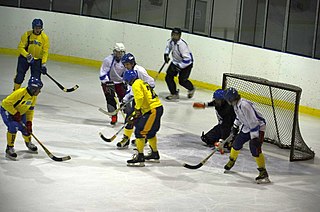
Rink bandy is a variant of the larger sport of bandy. Unlike bandy which is played on a large bandy field, rink bandy is played on significantly smaller ice hockey-sized ice rinks.
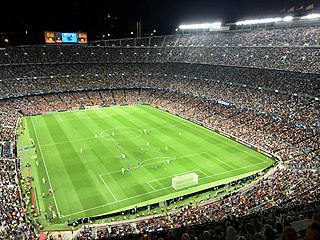
Sport in Europe tends to be highly organized with many sports having professional leagues. The origins of many of the world's most popular sports today lie in the codification of many traditional games, especially in the United Kingdom. However, a paradoxical feature of European sport is the extent to which local, regional and national variations continue to exist, and even in some instances to predominate.

The most popular sport in Russia is soccer. According to Yandex search analysis results rating of the most popular sports among Russians: "Football topped the list of the most popular sports in Russia" with 5 to 10 million requests. Ice hockey came in second with handball, basketball, futsal, boxing, auto racing, volleyball, athletics, tennis, and chess rounding out the top ten rankings. Other popular sports include bandy, biathlon, figure skating, weightlifting, gymnastics, wrestling, martial arts, rugby union, and skiing.
1913 European Bandy Championships was, according to some sources, a European Championship tournament for national teams in bandy held in February 1913 in Saint-Moritz or in Davos, Switzerland. However, there are no known contemporary sources for this and the oldest known source for the competition being held is from a Swedish book on bandy from the 1970s, itself not citing any sources. It is likely that the information could be a mixup with the actual 1913 LIHG Championship, which was an ice hockey tournament between ice hockey club teams from different European countries.

The Women's Bandy World Championships is an international sports tournament for women and the premier international competition for women's bandy among bandy-playing nations. The tournament is administrated by the Federation of International Bandy.
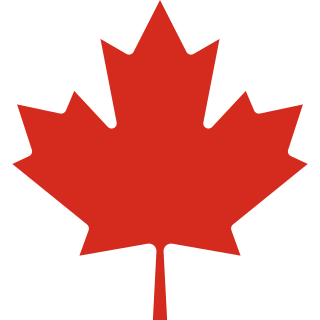
Canada's women's national bandy team is the women's bandy team representing Canada. Historically the squad has been based in Winnipeg, Manitoba. The women's national team has competed in the Women's Bandy World Championship and North American Bandy Championship. It made its world debut at the 2004 Women's Bandy World Championship. Team Canada has not competed internationally since the 2016 Women's Bandy World Championship.

The Bandy World Championship for youth teams is a group of sports tournaments held for bandy athletes competing for their junior national teams. There are four different age classes for boys and young men and one age class for girls. The tournaments are governed by the Federation of International Bandy.















